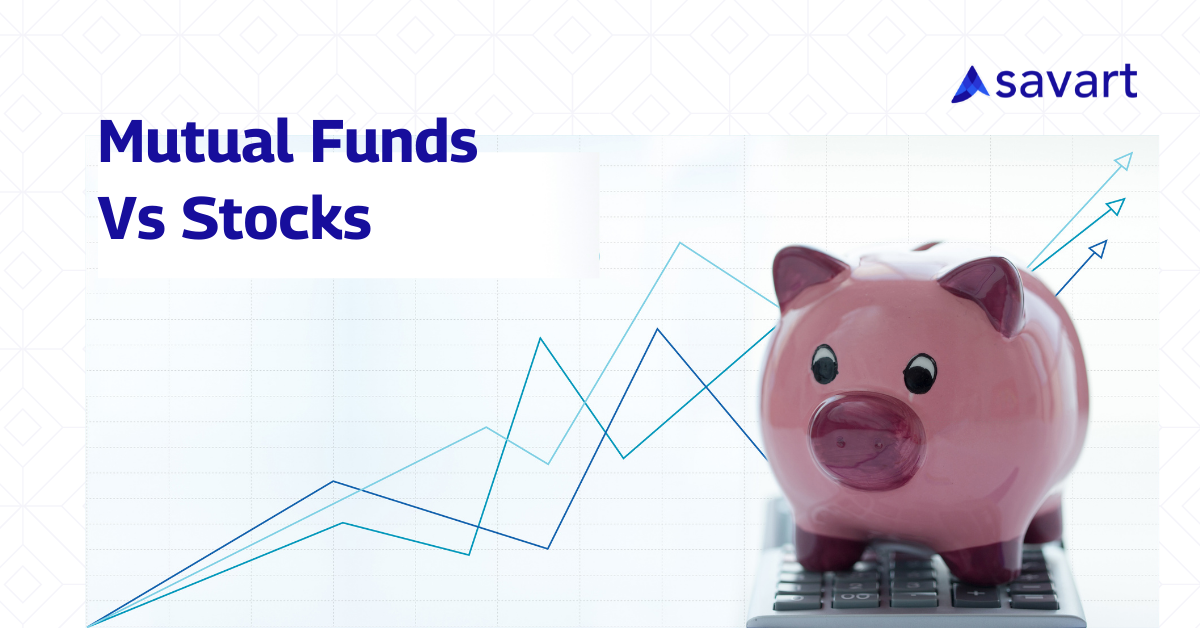Understanding Mutual Funds and Stocks
While talking about equity investments, most investors select between two types of instruments – Stocks and Mutual Funds. While these two overlap in many ways, each has its unique characteristic in terms of risk, diversification, fees, and much more.
In this blog, we will describe each, and compare the two to help you choose the one (or, both!) that best suits you.

An Overview
Stocks or shares represent proportional ownership in a company – investors can acquire this stake in a listed company by buying its shares on the stock market. When you buy shares in a company, you are investing in that company and its future. The traded price of the stock usually fluctuates with the fortunes of the company, and with the demand-supply of its shares. But over time, as the company performs well, the value of its shares usually goes up. Similarly, one can sell shares that one owns based on one’s needs and the company’s performance.
History shows that some companies (in select periods) have offered stellar returns to their shareholders. History shows that some companies (in select periods) have offered stellar returns to their shareholders. For example, Deepak Nitrate Ltd’s shares grew 12,929% in the last decade. On the flip side, Yes Bank shares have lost over 72.05% of their value.
Decisions to buy, hold or sell shares of a company require a thorough understanding of one’s needs, the company’s past performance and future plans, and the overall macro-economic environment.
On the other hand, a mutual fund is usually a pool of stocks, bonds, and short-term debt. Mutual Funds are managed by Asset Management Companies (AMC) and each Mutual Fund has one or more professionals to actively manage it. A vast variety of mutual funds are available to select from based on the characteristics of their underlying instruments. For example, mutual funds that specialize in the stocks of the IT industry, or those that invest only in shares of Large cap companies across industries while others may only offer access to corporate bonds. In general, mutual funds focus exclusively on equities, only fixed income instruments or a combination of these two.
Every investor putting money into a Mutual Fund gets proportional units allotted from the overall fund. While investing in mutual funds, one does not get ownership of the underlying stocks, but only of the specific mutual fund (scheme).
Stocks vs Mutual Funds: Top factors to consider
Cost of investment
“Investment cost” is one of the crucial factors to consider before investing. Since fractional stock ownership is not possible yet in India, one often needs a large sum of money to acquire even a single stock with a high share price. For example: to own a single share of MRF, one needs Rs.75000! While some mutual funds will allow a minimum investment of Rs. 500. investment per transaction.
Diversification
“Don’t place all your eggs in one basket” is a rule that applies very well in investments. Diversifying your investments has more scope for more positive returns. If you have Rs. 5000 INR, you can only pick up a maximum of two or three stocks at the most. Your investment can come down drastically if there is a drop in the shares’ fundamentals.
If you can invest the same amount into a mutual fund, your money is spread across a dozen instruments or so. Even if one or two stocks go down, the other securities will balance your portfolio, helping you protect your investments.
Investment Choices
Both stocks and equity mutual funds offer choices in terms of industries and the size of companies to invest in. Through Balanced and Debt options, mutual funds offer additional avenues for investors to select from.
Risk & Return
Market risk volatility is high for both stocks and mutual funds. That said, careful selection of mutual funds that balance large cap and small cap and equity and debt can help build a portfolio with a better return to risk ratio.
Tax Savings
There are certain types of funds like Equity-Linked Savings Schemes (ELSS) that help with reducing taxable income (within annual limitation as prescribed by the government) under section 80C of ITA. There are no such options in stocks to benefit from taxes.
Also, read: Income Tax On Mutual Funds – How Are Mutual Funds Taxed?
Bottomline
In conclusion, both stocks and mutual funds have their pros and cons. For those who are new to investing, mutual funds may be the best option because they offer diversity and are typically less risky. However, for those who are more experienced investors, individual stocks may be a better option because they offer the potential for greater returns. It is important to do your research and consult with an investment advisor to determine which investment is right for you.
Savart App provides reliable and high-quality investment advice based on your personal profile and needs. Download Savart App now!
-

Individual investors engage in stock market activity for a variety of reasons, e.g., long-term gains, short-term gratification, experiencing daily highs/lows, learning, applying intellectual strategies, etc. Their approaches to achieving these objectives can be broadly classified as active or passive in terms of the time spent analyzing the markets and their frequency of transactions. Let’s understand […]
-

7 Common Investing Mistakes That Can Reduce Your Returns from the Market Investing is an exciting experience. But it can also overwhelm people, especially those who are starting afresh. By their very nature, stock markets go up and down – disciplined investors understand this, and develop strategies to reduce their risks during market lows (as […]

